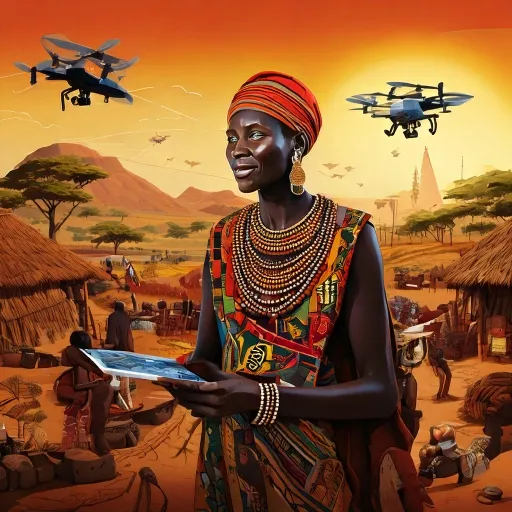Can AI and African values walk hand in hand? It’s a question that lingers in our churches, our homes, and our hearts. I’ll never forget the Sunday my uncle brought up a topic about Artificial Intelligence at our family lunch. The table went quiet, forks paused mid-air. It wasn’t just the word “AI” that stopped us, it was the question behind it: What’s this thing going to mean for us?
Here in Africa, where faith isn’t just a belief but the heartbeat of our daily lives, new tech like AI doesn’t just get a free pass. We look at it closely, wondering if it’ll walk with our values or pull us somewhere we don’t recognize.
Faith, for us, isn’t a Sunday-only affair. It’s how we teach our kids to share, how we settle disputes under the dogonyaro tree, how we find hope when the rains don’t come. So when AI steps into our world, promising to rethink how we work, learn, or even pray, we don’t just nod and move on. We pause. We ask: “Will this honor who we are?” It’s not about being stuck in the past, it’s about protecting what makes us, “us”.
There’s a worry I’ve heard in church halls, in market stalls, even in late-night WhatsApp chats with cousins. It’s not that AI is some sci-fi villain. It’s that it might start speaking so loudly, through our phones, our news, our choices, that we stop hearing the voices we’ve always trusted. The ones from our pastors, our grandmothers, our own hearts. These AI systems? They weren’t built with our proverbs in mind. They don’t know the weight of a local tale by moonlight story or the joy of an owambe wedding song. When their answers don’t echo our truths, it feels like a friend who doesn’t quite get you.
Then there’s the question of who gets to join the AI party. Sure, we talk about Wi-Fi and smartphones and trust me, those are real hurdles. But it’s bigger than that. Most AI tools are fed data that skips over our stories, our languages, our ways of seeing the world. Using them can feel like borrowing someone else’s clothes, nothing fits right. You fumble, you struggle, you adjust to get an answer that fits and sometimes you just walk away, wondering if this tech was ever meant for you.
But here’s where the story shifts, and it’s why I’m not throwing my hands up. We don’t have to pick between our roots and the future. AI isn’t a wall, it’s a canvas. And Africans? We’ve always known how to paint something beautiful, even with borrowed brushes. Across the continent, I’m seeing it already. In Nigeria, young coders are building apps to translate K12 lessons into different languages, using AI to design lesson plans in Hausa, reaching kids who’ve never seen a textbook. These aren’t machines taking over, they’re tools in the hands of people like my neighbor, Sarah, who runs a literacy program and now uses an app to track her students’ progress. That’s not cold tech. That’s “hope” with a keyboard.
For this to spread, we need everyone in the room, our pastors dreaming big, our aunties sharing wisdom, our tech-savvy nephews coding the next big thing. We’ve got to ask the tough stuff: How do we make AI speak Igbo, Amharic, or Wolof? How do we teach it to respect our elders’ advice, not just Google’s top hits? This isn’t about catching up to the world, it’s about leading it. With 1.4 billion of us, 60% under 25 and buzzing with ideas, Africa’s not just in the AI conversation, we’re ready to rewrite it.
Imagine this: AI that doesn’t just crunch numbers but carries our soul. Tools that suggest solutions steeped in our values, community, faith, resilience. Picture a health app that reminds you to check on your neighbor, not just your heart rate. Or a chatbot that answers in Chichewa, quoting a proverb your grandma would nod to. That’s not a pipe dream. It’s a future we can build, one where tech doesn’t just work for us, it “feels” like us.
We’re not late to the game. We’re the ones who can change how it’s played. So let’s grab this moment, our moment and shape AI into something that carries our laughter, our prayers, our pride. Let’s reimagine a world where progress doesn’t pull us apart but weaves us closer, one solution, one story, one uniquely African voice at a time.
What do you think?
How can we make AI reflect the heart of Africa? Share your thoughts below, I’d love to hear your story.
